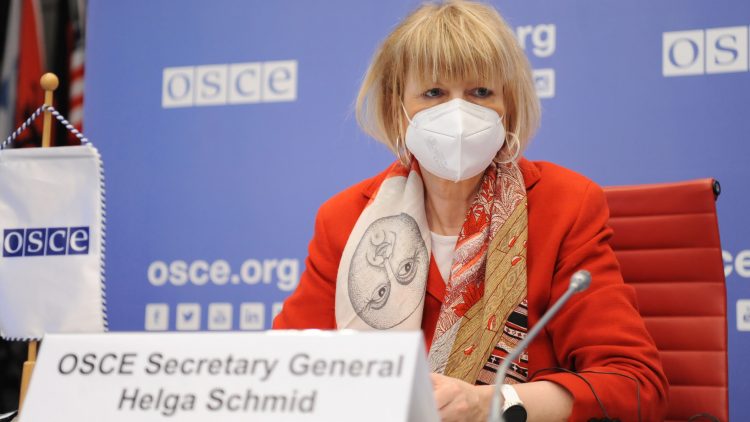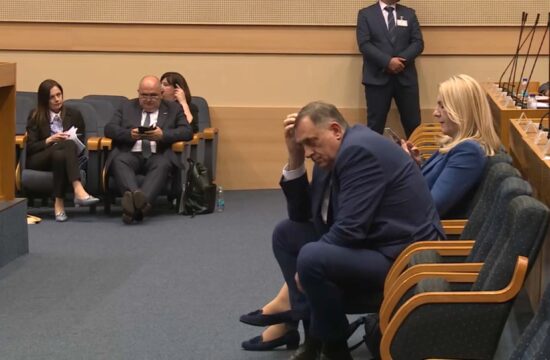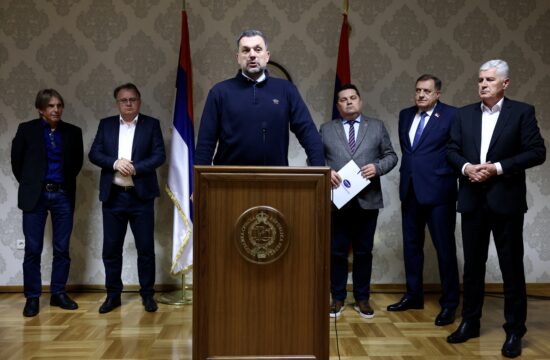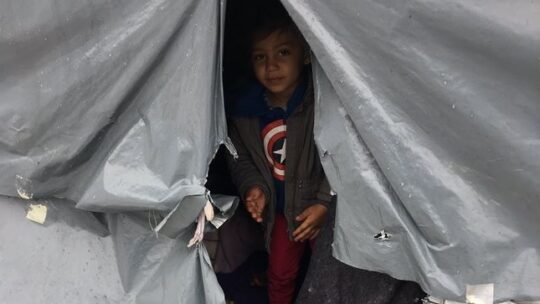
In an exclusive interview with N1, Helga Maria Schmid, the OSCE Secretary-General, called on BiH authorities at all levels to come together and agree on sustainable solutions for the growing migrant humanitarian crisis, based on human rights.
N1: What is your key priority in the next three years – if you could be entirely transparent for N1, please?
I will focus on supporting the OSCE Chairperson-in-Office – this year Foreign Minister Ann Linde of Sweden – and working with all 57 participating States on “bridge-building”, rebuilding trust through dialogue, and taking a co-operative approach to addressing security challenges that we all face.
It is vital we strengthen the early warning function of the OSCE. The Organization’s tools and instruments to quickly alert and react to emerging crises, can and should be better utilized. This will give us a head start in remedying problems before they escalate.
We live in a world where no country can address the big security challenges of our time alone – the current COVID-19 pandemic illustrates this so clearly. Indeed, the very transnational character of threats like this demands co-operative and joint solutions by States working together.
I have been a firm believer in international co-operation and multilateralism throughout my diplomatic career. We need to be joined up, multilateral responses to security threats because national solutions will ultimately not be sustainable. This is where the OSCE – the world’s largest regional security organization – can add real value.
We already see the OSCE’s broad and diverse constituency of 57 States working together to counter terrorism, prevent cyber-attacks, fight corruption and combat human trafficking. We can capture that spirit and momentum to drive discussion and positive change in other areas of security too, including our collective responses to emerging challenges, such as new technologies if misused.
In fact, I want to further promote a cross-dimensional approach to tackling security challenges: this means not seeing the politico-military, economic and environmental, and human dimensions of security as separate, but as interlocking, complementary and mutually reinforcing. This is how we can ensure that our solutions towards peace, stability and resilience will be impactful and sustainable. This is what the OSCE’s comprehensive approach stands for.
As the first woman Secretary-General of the OSCE, I aim to build awareness of the value and importance of equal rights and opportunities for women and men. It is particularly important for an organization like the OSCE – that works to promote peace and stability – to inspire others to follow.
It is impressive how much the OSCE does to prevent conflicts and strengthen security throughout our vast region. Therefore, another of my priorities will be to make the OSCE’s work better known, and to raise awareness of our common values and commitments.
N1: What do you think is the most concrete work done by the OSCE in BiH – especially the link to the stability of peace in the country?
The OSCE has worked hand-in-hand with BiH citizens to bring peace and democracy to the country – as envisioned by the Dayton Peace Agreement.
The OSCE Mission to BiH has supported critical reform processes in BiH over the past 25 years. A notable achievement was its leading role in the establishment of a state-level Ministry of Defense and BiH Armed Forces. The OSCE Mission continues to assist BiH institutions in conducting effective arms control, safely reducing weapons and ammunition surpluses, and contributing to regional arms control and non-proliferation efforts – all of which are crucial to ensuring BiH’s security.
A milestone in combating discrimination in Bosnia and Herzegovina was the establishment of the BIH Ombudsman institution, where the Mission played a key role.
The OSCE Mission’s trial monitoring programme, unique in BiH, positioned the Mission as a key partner of BiH judicial institutions when it comes to war crimes processing and contributing to reducing the huge backlog of cases before courts in the country.
These are just a few of the examples of our work in BiH. The OSCE is a reliable partner involved in assisting BiH in many key processes and reforms. BiH can count on the OSCE for ongoing support to achieve this.
N1: How strong and stable is the BiH democracy its existing politicians?
The most significant risk to a developing democracy is a loss of faith in institutions, which can happen when people lose trust in politicians.
Democracy succeeds when people participate, make their concerns known through appropriate channels, are active in their communities, and hold their leaders accountable.
There are many reforms that need to be implemented urgently if BiH is to avoid being left behind in terms of its democratic development and future economic growth. Other countries in the region have made significant progress in economic and democratic development in recent years.
BiH has great potential to do the same. Political leaders must create the conditions where constructive compromise is possible.
N1: How would you evaluate relations in the region – do you think they are artificial relations like those 30 years ago or honest, with pure intentions?
In the last 20 years, South-Eastern Europe has made considerable progress in consolidating peace, stimulating economies and strengthening democratic institutions and the rule of law.
However, these positive trends continue to be spoiled by many challenges that are too numerous and complex for one country to tackle alone, as shown by the current pandemic.
Indeed, I am very happy to see that governments in recent years have displayed a genuine commitment to strengthening regional co-operation processes to ensure peace, security and stability, and ultimately overcome the deep-seated legacies of the past.
The regionally owned “Mini Schengen” process, for example, is indicative of the region’s sincere readiness and willingness to advance good neighbourly relations and achieve economic prosperity in the region. The OSCE, also through the work of its Field missions, will continue to support regional initiatives to promote reconciliation and foster trust and confidence amongst people.

N1: Are the Balkan countries still “enemies” because of politics – do citizens need to change their politicians to move on from the past to the future?
I would rather say that countries in South-East Europe continue to co-operate and make progress despite some obstacles. In my previous engagement and now at the OSCE, I witnessed a constant constructive and goal-oriented dialogue within the region.
More than ever, political leaders in the region must demonstrate their ability and vision to go beyond party interests and break from the comfort of relying on ethnic narratives. It is up to them to both deal with the past and look to the future, with the support of the international community.
It is also up to the citizens of the region to elect and support decision-makers to lead them to a future with better living standards, lower unemployment rates, high-level education standards, effective justice systems.
In that regard, civil society actors are central to the political, societal and economic transformation of the region. They should be supported by governments and the international community to promote citizen-participation and build mutual trust and tolerance in the region.
N1: BiH has been facing a migrant crisis in the last couple of years and the solution is nowhere to be found. Who is to blame and responsible: the country and/or International Organizations? What does the OSCE see as the solution?
I have been following the migrant crisis in BiH since my time in Brussels, and the situation has now escalated with even more human suffering and chaos. Without question, a solution must be found quickly.
Over the last several years, BiH has witnessed a dramatic increase in the number of migrants and refugees entering the country. The influx has strained human and financial resources, especially in the northwestern part of the country.
Unfortunately, the main findings of the OSCE Mission to BiH 2018 assessment on the migrant and refugee situation are still valid today. These include a lack of effective co-ordination and communication between the responsible institutions, insufficient capacities of relevant government bodies, and a lack of clear guidelines, standard operating procedures, and referral mechanisms.
There is a dire need for improved coordination at the highest level, including all relevant stakeholders, both governmental and non-governmental.
I call upon authorities at all levels of government to develop and agree upon sustainable and human rights-compliant solutions to this growing humanitarian crisis.
N1: If I could please ask you one brief question – You are German, therefore, what can we expect from your fellow compatriot, future High Representative, Mr Christian Schmidt? You might know him personally.
The OSCE has co-operated with the OHR since its establishment, working together on many different initiatives. We continue to work closely with the Office of High Representative. Our goals are aligned: a functional and effective Bosnia and Herzegovina.





Kakvo je tvoje mišljenje o ovome?
Budi prvi koji će ostaviti komentar!